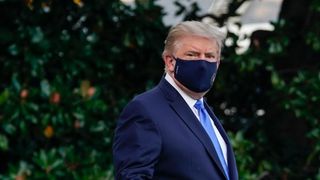It was the same shock as when US president Ronald Reagan was shot in March 1981: "Oh my God, it's the president, is he going to be OK? Who is in charge in the White House? Who is running the country? What happens next?"
Reagan was gravely wounded, and operated on swiftly. (He asked his doctors, just before going under, "I hope you're all Republicans?") Even though President Donald Trump, who announced on Friday he had tested positive for COVID-19, is in Walter Reed hospital outside Washington, the virus is still firing shots inside his body. Reagan recovered and served two full terms. Trump is fighting with everything he has for his second.
That Trump's illness occurred just 32 days before the national election is, like so much that has unfolded throughout this presidency, unprecedented.
Even under stress, in the immediate aftermath, the chain of command is clear and has not been disrupted. The next principals in line of succession for the presidency, Vice-President Mike Pence and the Speaker of the House Nancy Pelosi, are fine and safe. There is no apparent need – yet – for Trump to invoke the 25th Amendment's provisions for the Vice-President to serve as acting president if Trump is incapacitated. Today's technology ensures much more robust command-and-control than the telephones that previous presidents, from Lyndon Johnson to the Bushes, wielded like weapons.
That Trump's illness occurred just 32 days before the national election is, like so much that has unfolded throughout this presidency, unprecedented. That the virus seems to be claiming more of his circle, including former adviser Kellyanne Conway and campaign manager Bill Stepien, is especially alarming.
In discussing the fallout from the out-of-control "debate" a few days earlier between Trump and former vice-president Joe Biden, I wrote that, in addition to all the fallout from Trump's explosive performance on that stage, "There are wildcards that could come into play. No one is immune from coronavirus. If Trump or Biden gets sick, that will change the race."
And it has. Trump events will be suspended for some days at the least. This deprives him of the jet fuel he gets from the crowds in airport hangars cheering for him. Over the past weeks, this contrasted sharply with Biden's COVID-safe campaigning, where he deliberately stayed close to home, Zoomed into meetings and community forums and fundraisers, always wore a mask in public, and ensured people were safely distanced.
But the low-key contrast with Trump's conjuring up an aura of near-normalcy – the illusion that the virus was not an issue for his campaign rallies, and that Biden was over-reacting – led many to think that Biden was lagging, that the low-octane presence meant he was behind in building the genuine popular enthusiasm seen as essential to securing a mandate of popular assent that will deliver the White House on election day.
Harris' ability to project, while standing across the stage from Pence, that she has the right stuff to be president – and enough of it to at least equal the measure of the man who has been closest to the presidency for over three years – will be an added factor as voters make their choice.
Biden has also conveyed the decency and goodwill that can come from 47 years in Washington. "This cannot be a partisan moment. It must be an American moment. We have to come together as a nation," he tweeted after the President announced his diagnosis.
Because the pathways for the physical campaign are not clear yet – will there be another presidential debate, will Trump return to the trail? – we have only limited visibility on the playbook. The expectation today is that this week's vice-presidential debate between Mike Pence and Kamala Harris will occur.
But it now has a deeper dimension. Seen together on the platform, viewers will apprehend that they may well be looking at the next president. So Harris' ability to project, while standing across the stage from Pence, that she has the right stuff to be president – and enough of it to at least equal the measure of the man who has been closest to the presidency for over three years – will be an added factor as voters make their choice.
Over the past 88 years, since Franklin D. Roosevelt, presidents lose their re-election bids when it is clear to voters that they cannot manage the crises thrust upon them. For Jimmy Carter (who turned 96 last week) in 1980, it was the agony of the Iran hostage crisis and a terrible recession. When Ronald Reagan asked voters, "Are you better today than you were four years ago?" the answer was obvious. George H. W. Bush, exceptional manager of the end of the Cold War and hero of the first Gulf War, suffered a decline in approval of more than 60 points because he could not conquer a brutal recession.
Will all of Trump's base stick? And for undecided voters, the question they will ask is: "With 207,000 Americans dead, and the virus in the White House, do I have confidence in him to see this through – next year and for the next four years?" Or will there be more confidence in Biden's judgment in how to defeat COVID?
Trump's strong suit is the economy before the virus hit. Although half the 22 million jobs lost since February have been restored, those still unemployed exceed the total jobs lost during the entirety of the Great Recession. Biden will argue that he led Obama's economic recovery program in 2009 – it was enacted within the first 100 days of his presidency, and led to 10 years of growth – and he will say, "I can do it again." Thirty-one days to go. There will be more surprises.






